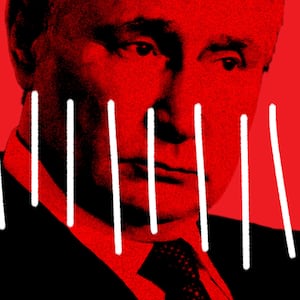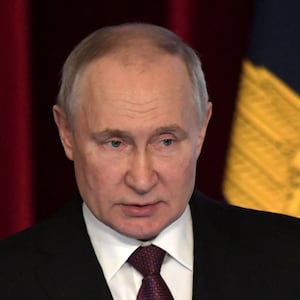While Moscow has publicly dismissed the Hague’s arrest order for Vladimir Putin as nothing more than a meaningless piece of paper, some government officials reportedly descended into a full-blown panic in private chats after the news broke—with some wondering if they’d become the next Heinrich Himmler and Joseph Goebbels.
That’s according to a new report from the independent outlet Verstka, which spoke with sources close to the Kremlin and several sources in parliament about the reaction behind the scenes.
The news spread “like fire” in private chats between officials in the presidential administration, one source close to the Kremlin said, adding that reactions were “strong, mostly unprintable.”
“There was a sense that they [in the West] had crossed the line, that it was like a slap in the face for all of us,” he said.
Others suddenly began to realize that they too could face war crimes charges.
“There was an instant thought that there are not only sanctions against [us], but also more serious things, that it would be impossible to leave the country,” one source in a government ministry was quoted as saying. He said he himself did not expect to face any criminal prosecution, but that other members of the government could “maybe” go down.
Two sources in the Russian parliament reportedly drew parallels to members of Adolf Hitler’s inner circle who killed themselves before they could be tried in the Nuremberg Trials, Heinrich Himmler and Joseph Goebbels. One of them also recalled the fate of Libyan leader Muammar Gaddafi after the International Criminal Court issued a warrant for his arrest that accused him of crimes against humanity.
Members of the Federation Council, the upper chamber of parliament, discussed with each other how Moscow could effectively respond to the arrest warrant after the news broke, sources said.
But they came up empty, according to one lawmaker, who admitted, “We haven’t come up with anything yet.”
“This is some kind of blow to us [the Russian authorities] that our leader is supposedly an international criminal,” a source in parliament said.
“On the one hand, it makes you rally around him. On the other hand, it’s as if we really are in complete global isolation.”
Another source lamented that the West, according to him, had lost all “common sense.” It was “very unpleasant,” he said. “I couldn’t think about anything after [the warrant], I felt anger and sadness.”
While the Kremlin’s more outspoken mouthpieces publicly blasted the court’s order and claimed it didn’t pose any actual threat to Putin, lawmakers were reportedly advised to stay mum on the matter, and state-run news programs largely made no mention of it.
The only coordinated responses came from Russia’s Investigative Committee, which said it had launched a criminal case against judges of the International Criminal Court, and pro-Putin youth groups who launch a bizarre social media campaign using the hashtag “#WeAreAllPutin.”








